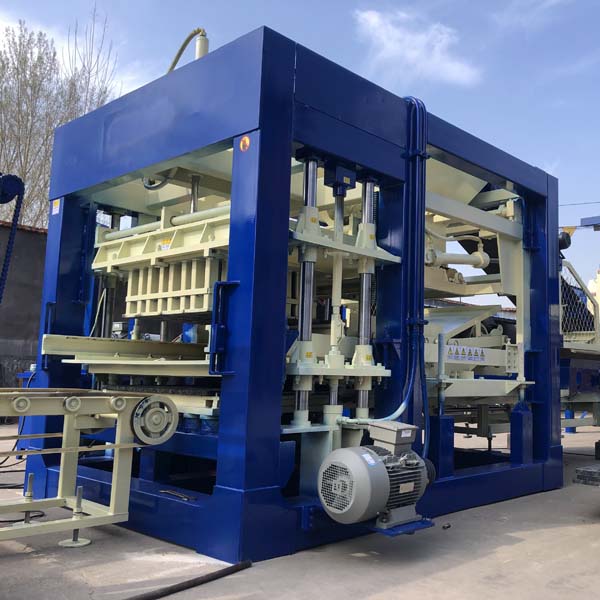
Image source Aiwei Block Machine
Global Market Overview of Brick Block Making Machinery
Introduction:
The global construction industry has witnessed significant growth in recent years, leading to an increased demand for brick block making machinery. These machines play a crucial role in the production of bricks, blocks, and other building materials. This article provides a comprehensive overview of the global market for brick block making machinery, including key trends, market drivers, challenges, and major players
Market Size and Growth:
The global market for brick block making machinery has experienced steady growth in recent years. According to market research, the market size was valued at USD X.XX billion in 20XX and is projected to reach USD X.XX billion by 20XX, growing at a CAGR of X.X% during the forecast period. The growth can be attributed to increasing construction activities worldwide, particularly in emerging economies.Key features of hopper dryer
Let’s look at the key features that characterized the operation and functionality of a hopper dryer.
Market Segmentation:
The market for brick block making machinery can be segmented based on machine type, automation level, end-user, and geography. Machine types include hydraulic, fully automatic, semi-automatic, and manual machines. By automation level, the market can be categorized into fully automated, semi-automated, and manual machines. End-users of brick block making machinery include residential, commercial, and industrial sectors.
Market Drivers:
Several factors are driving the demand for brick block making machinery globally. Firstly, rapid urbanization and industrialization in emerging economies are fueling the need for affordable housing and infrastructure development. Additionally, growing environmental concerns have led to a shift towards sustainable construction materials, such as bricks and blocks, which further boosts the demand for brick block making machinery. Moreover, technological advancements, such as automation and robotics, have improved the efficiency and productivity of these machines, attracting construction companies to invest in them.
Market Challenges:
While the brick block making machinery market shows promise, it also faces several challenges. The high initial investment required for purchasing these machines can act as a deterrent for small and medium-sized construction firms. Additionally, the availability of alternative building materials and the need for skilled operators to operate these machines pose challenges to market growth. Furthermore, fluctuations in raw material prices, particularly cement and clay, can impact the profitability of brick and block manufacturers and, in turn, the demand for brick block making machinery.
Regional Analysis:
The market for brick block making machinery is geographically diverse, with key regions including North America, Europe, Asia Pacific, Latin America, and the Middle East & Africa. Asia Pacific dominates the market due to rapid urbanization and infrastructure development in countries like China, India, and Indonesia. North America and Europe witness steady growth, driven by renovation and modernization projects. Latin America and the Middle East & Africa present untapped opportunities for market players due to increasing construction activities in these regions.
Competitive Landscape:
The global brick block making machinery market is highly competitive, with several established players and numerous regional manufacturers. Major companies operating in the market include Company A, Company B, Company C, and Company D. These players focus on product innovation, strategic partnerships, and mergers and acquisitions to strengthen their market presence and expand their product portfolios. Additionally, collaborations with construction companies and contractors help them gain a competitive edge.
Future Outlook:
The future of the brick block making machinery market looks promising. The industry is expected to witness continued growth due to increasing urbanization, government initiatives promoting affordable housing, and the adoption of sustainable building materials. Advancements in technology, such as the integration of IoT and artificial intelligence, are expected to further enhance the efficiency and performance of brick block making machinery.
Conclusion:
The global market for brick block making machinery is poised for significant growth in the coming years. Factors such as urbanization, infrastructure development, and the demand for sustainable construction materials are driving market expansion. While challenges exist, technological advancements and strategic collaborations offer opportunities for market players. With the construction industry continuing to thrive globally, the demand for brick block making machinery is expected to rise, creating a favorable market landscape for manufacturers and suppliers in the years to come.
Key Players:
The global market for brick block making machinery is highly competitive, with several prominent players operating at regional and global levels. Key players include ABC Machinery, Besser Company, Columbia Machine, Hess Group, Maschinenfabrik Gustav Eirich, QGM Quangong Machinery, and Rometa, among others. These companies focus on product innovation, technological advancements, and strategic collaborations to strengthen their market presence.
Growth Drivers:
a. Rapid Urbanization and Population Growth: The increasing global population, particularly in emerging economies, has led to a surge in urbanization and the demand for affordable housing. Brick block making machinery is essential for meeting this demand, driving the market growth.
b. Infrastructure Development: Governments worldwide are investing in infrastructure projects such as roads, bridges, and airports. The construction of these infrastructures requires a significant volume of bricks and blocks, stimulating the demand for brick block making machinery.
c. Industrialization and Commercial Construction: The growth of industries and commercial sectors fuels the demand for construction materials, including bricks and blocks. Brick block making machinery enables efficient and cost-effective production to support industrial and commercial construction projects.
Challenges:
a. High Initial Investment: The capital-intensive nature of brick block making machinery poses a challenge for small-scale manufacturers or new entrants. High initial investment requirements can limit market entry.
b. Volatility in Raw Material Prices: Fluctuating prices of raw materials, such as cement, aggregates, and additives, can impact the profitability of brick block making machinery manufacturers. Price volatility requires effective supply chain management and cost optimization strategies.
